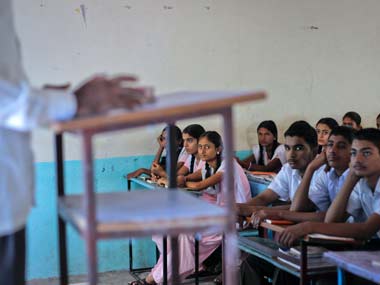Panaji: The RSS and Goa’s influential Roman Catholic Church are headed for a collision over whether English or regional languages like Marathi or Konkani should be backed as a medium of instruction for primary school students. The Rashtriya Swayamsevak Sangh-backed Bharatiya Bhasha Suraksha Manch (BBSM) has threatened an agitation over what it sees as BJP-led coalition government’s obvious pandering of to the Catholic community in general, and the Church-run schools in particular. The normally reticent state RSS chief Subhash Velingkar has openly lashed out at the Church, to which more than a quarter of the state’s population which is Catholic owe allegiance, while also exhorting supporters of Indian languages to attend a protest meet on Friday. [caption id=“attachment_2383080” align=“alignleft” width=“380”]  Representational image. Reuters image[/caption] “Those who believe that the Church is committing dadagiri, poking its nose in everything which fosters opposition of local culture, should be there,” Velingkar said while addressing a BBSM meeting. The meet was called a day after an association of parents called the Forum for Rights of Children to Education (FORCE) backed English as the medium of instruction through a well-orchestrated week-long protest that brought the state government to accede to them. The association consists of parents mostly from the Catholic-dominated South Goa but also includes those from other coastal villages. “We stand for a principle. The parents should be allowed to choose the medium of instruction in schools where our children study. To do this, both vernacular as well as English schools should be allowed grants as a matter of policy,” Force’s Savio Lopes told Firstpost. Savio sat on an eight-day long hunger strike and relented only after a written assurance given by several legislators that their demands will be met. While language obviously appears to be at the centre of the battle, the real war between the two groups is over money; specifically financial grants from the state education ministry that are in excess of Rs 70 crore. The BJP which won the 2012 state assembly elections, thanks to a strategic alliance with leaders of the Catholic community, is now caught between promises the party made to minority community leaders which back Force as well as the BBSM with whom it had joined forces while in the opposition. After coming to power, the BJP government had, through a cabinet decision in 2012, decided to give grants to schools whose medium of instruction is English only if they were minority institutions (read Church-run). Schools run by private trusts or persons would receive grants only if the medium of instruction is Konkani or Marathi. Force now wants the government to etch its cabinet decision in stone, by passing a law to this effect. The move is being strongly opposed by the BBSM and the RSS, which is demanding that the government give grants only if these minority-run schools opt for either Konkani or Marathi as a medium of instruction. They have directly questioned the role of the Church in instigating the agitation. “They lied to (the) parents. They pealed the Church bells to lure parents… We have to see what these unethical people are up to in the future. We believe they have issued a threat and we are capable of responding to these threats,” Velingkar said. “We want the government to stand firm on this, if not, we don’t mind if this government falls,” the normally reclusive Velingkar added. Secretary of the Archdiocesan Board of Education, Far Zeferino D’Souza has denied the church has urged or orchestrated any protest. The Archdiocesan Board of Education runs nearly 130 primary schools in the state. Prior to 1991, the schools had English as the medium of instruction. However, following a court order asking the schools to pay teachers on the same scale as government school teachers the church-run schools approached the government for help. The then government asked church-run schools to change their language of instruction to either Konkani or Marathi, if they wanted the grants. Faced with no option, the Church had agreed, leading to howls of protests from parents. Two decades later, the issue came back to haunt the Church with a parents’ uprising, demanding that the government give grants to schools irrespective of language of instruction and let parents choose what language their child should study in. “It was the Church that first agreed to Konkani and now wants English after it has seen the numbers in its schools dropping. That is the cause of the problem,” Radharao Gracias, a lawyer who had led earlier agitations against the then government’s decision, told Firstpost. Members of Force, however, deny that it is an issue that has anything to do with religion. “People irrespective of religion want to send their children to English medium schools. Why should the option be only given to the rich who can send their children to private schools?” Force’s Savio Lopes said. To buttress their point, the organisation has revealed statistics to show that despite the schools being run by the Church, a majority of the students studying in these institutions were from the majority community. Official figures also state that 77 of these 130 schools have a majority of Hindu students while only 52 schools have a majority of Christian students. This constitutes the bulk of the schools teaching in English at the primary level. “These figures become significant as the Bharatiya Bhasha Suraksha Manch, which was opposing giving government grants to English medium primary schools, had targeted the Church as well as the Christian community for demanding English medium, terming them as de-nationalised and even anti-nationals,” journalist Sandesh Prabhudesai, who has been following the issue closely, said. The writer is the Goa correspondent for the Indo-Asian News Service
The RSS and Goa’s influential Roman Catholic Church are headed for a collision over whether English or regional languages like Marathi or Konkani should be backed as a medium of instruction for primary school students.
Advertisement
End of Article


)
)
)
)
)
)
)
)
)



